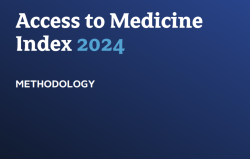2024 Access to Medicine Index
Explore in detail how the pharmaceutical companies perform on Access to Medicine Index and AMR Benchmark
Compare companies|
1
4
|
Novartis AG |
0
1
2
3
4
5
|
3.78 | |
|
2
1
|
GSK plc |
0
1
2
3
4
5
|
3.72 | |
|
3
8
|
Sanofi |
0
1
2
3
4
5
|
3.52 | |
|
4
6
|
Pfizer Inc |
0
1
2
3
4
5
|
3.50 | |
|
5
3
|
AstraZeneca plc |
0
1
2
3
4
5
|
3.43 | |
|
5
2
|
Johnson & Johnson |
0
1
2
3
4
5
|
3.43 | |
|
7
5
|
Merck KGaA |
0
1
2
3
4
5
|
3.27 | |
|
8
13
|
Boehringer Ingelheim |
0
1
2
3
4
5
|
3.20 | |
|
9
7
|
Takeda Pharmaceutical Co, Ltd |
0
1
2
3
4
5
|
3.16 | |
|
10
9
|
Bayer AG |
0
1
2
3
4
5
|
3.13 | |
|
11
10
|
Roche Holding AG |
0
1
2
3
4
5
|
3.07 | |
|
12
11
|
Novo Nordisk A/S |
0
1
2
3
4
5
|
2.88 | |
|
13
15
|
Bristol Myers Squibb |
0
1
2
3
4
5
|
2.63 | |
|
14
12
|
Eisai Co, Ltd |
0
1
2
3
4
5
|
2.62 | |
|
15
16
|
Astellas Pharma Inc |
0
1
2
3
4
5
|
2.23 | |
|
16
14
|
Gilead Sciences |
0
1
2
3
4
5
|
2.21 | |
|
16
18
|
Merck & Co, Inc |
0
1
2
3
4
5
|
2.21 | |
|
18
17
|
Daiichi Sankyo Co, Ltd |
0
1
2
3
4
5
|
1.94 | |
|
19
20
|
Eli Lilly & Co |
0
1
2
3
4
5
|
1.84 | |
|
20
19
|
AbbVie Inc |
0
1
2
3
4
5
|
1.61 |
0
1
2
3
4
5
|
The ranking above shows the position and score of each company in the 2024 Index (left) and 2022 Index (right). Click on a company's name to go to its full report card.
Insights
Novartis leads, followed closely by GSK
In this ninth iteration of the Index, Novartis ranks as the top company for the first time, followed closely by GSK, which has previously been in first position across all Index reports. Sanofi has newly joined the top three. Pfizer joins the top five, and Boehringer Ingelheim rises into the top ten.
Report Cards highlight next steps
Each company has a Report Card providing a detailed overview of its performance in the 2024 Index, including a summary of its strengths and weaknesses, drivers behind changes in its ranking, as well as tailored Opportunities to improve and maximise its access-to-medicine efforts.
Some progress, some stagnation
The 2024 Access to Medicine Index shows an overall stagnation in pharmaceutical companies’ efforts to improve access to their essential healthcare products across low- and middle-income countries (LMICs), which is evidenced by uneven progress across the Technical Areas assessed by the Index. Companies are maintaining comprehensive policies and promising commitments to expand access, with the Index identifying specific initiatives from several companies aimed at addressing chronic gaps in underserved regions. However, progress in the implementation of these initiatives is somewhat limited.
Best Practices: Standout examples that can support improved access to medicine
The 2024 Access to Medicine Index has identified eight ‘Best Practices’ across the three Technical Areas. There is one in Governance of Access, one in Research & Development, and six in Product Delivery. Some of these focus on a single company, while others draw on examples from several companies.
Ranking Analysis
Novartis and GSK stand out as the two leaders
Novartis (1st) and GSK (2nd) rank within the top three performers across all three Technical Areas, with Novartis leading in Governance of Access and Research & Development (R&D). The company has robust governance structures in place and demonstrates how it puts policy into practice. For example, Novartis implements a process to measure patient reach (as assessed in Governance of Access) and demonstrates an increase in the number of patients reached through access strategies for its products assessed by the Index within Product Delivery.
In addition, Novartis performs well in R&D access planning for both communicable and non-communicable diseases (NCDs), where it has robust plans in place, with broader country coverage compared to peers. GSK demonstrates strong performance across the board, leading in Product Delivery, with a particularly strong performance in access strategies and licensing. It continues to have the largest priority pipeline in comparison to peers, with R&D access plans in place for most pipeline candidates.
Just behind the leaders, four companies rank as high performers
Sanofi, Pfizer, AstraZeneca and Johnson & Johnson, ranked 3rd to 5th respectively, rank above average in all Technical Areas, leaving little separation between them in terms of overall performance. Sanofi (3rd) and Pfizer (4th) have re-entered the top five, after dropping out in the previous Index. Sanofi leads in Governance of Access (alongside Novartis) and performs strongly in R&D, with a diverse pipeline of projects for NCDs and priority diseases.
Both Sanofi (3rd) and Pfizer (4th) stand out for engaging in large-scale inclusive business models to reach vulnerable populations, namely the Sanofi Global Health Unit and the Pfizer Accord for a Healthier World. AstraZeneca and Johnson & Johnson are tied in 5th place, both performing strongly overall. AstraZeneca performs strongly in Governance of Access and Product Delivery, demonstrating Best Practice in measuring the outcomes of its access strategies and its process for tracking the number of patients reached. Johnson & Johnson performs well in R&D, with access plans for all late-stage candidates – although its number of priority pipeline candidates has fallen significantly since the previous Index. Within Product Delivery, it performs well in health system strengthening and supply chain strengthening.
Middle-performing companies
Merck KGaA (7th) performs well in R&D; despite a decreasing priority pipeline, it still has access plans in place for all late-stage candidates. It has an above-average performance in Governance of Access and Product Delivery. Boehringer Ingelheim (8th) is one of the biggest risers, ranking in the top ten for the first time, due to strong performance in capacity building and health system strengthening initiatives. Additionally, it has also strengthened its strategy to ensure a continuous supply of medicines in low- and middle-income countries (LMICs). Takeda (9th) has a comprehensive access-to-medicine strategy integrated within its overall corporate strategy, as assessed within Governance of Access. It has R&D access plans and access strategies for marketed products; however, they tend to focus on a limited number of LMICs.
Bayer (10th) rounds out the top ten, demonstrating a strong performance in Governance of Access and has access strategies for its products across different income classifications; however, data on the outcomes of some of these strategies is limited. Bayer demonstrates Best Practice, alongside Roche (11th), for registering its products widely in LMICs. Although Roche has a large pipeline predominantly focusing on NCDs, it lacks access plans for some of these projects. Novo Nordisk (12th) performs well in Product Delivery, implementing equitable access strategies in LMICs and reporting the outcomes of these strategies, although it has a comparatively small pipeline compared to other companies. Bristol Myers Squibb (13th) has recently launched an inclusive business model to improve access to its innovative therapies in low-resource settings but falls behind other companies in Governance of Access. Eisai (14th) continues to perform strongly in long-term product donations and in R&D for priority diseases but many of its late-stage pipeline projects do not have an access plan.
Low-performing companies
Astellas (15th) has a consistent performance in Governance of Access, where it has a robust set of controls to promote ethical conduct and mitigate risk but falls behind its peers in R&D and Product Delivery. Gilead and MSD, (tied in 16th), both perform well in voluntary licensing and supplying products through supranational mechanisms. However, they fall short in terms of Governance of Access and access planning for R&D projects.
Daiichi Sankyo (18th) performs well in health system strengthening; however, it remains in the lower ranks of all Technical Areas. Eli Lilly (19th) rises one spot, newly engaging in technology transfer for some of its products, but still ranks in the lower tiers in all Technical Areas. AbbVie (20th) performs poorly across all areas and is the only company that did not share any processes for measuring and reporting patient reach.
How companies were assessed in the 2024 Index
The 2024 Access to Medicine Index assesses 20 of the world’s largest pharmaceutical companies in relation to 113 countries, including five countries newly in scope: Jamaica, Jordan, Lebanon, Marshall Islands and Saint Lucia. It looks at 81 diseases, conditions and pathogens, which have been identified as the most critical priorities. Compared to the previous Index, the number of indicators has increased from 31 to 32, which are spread across three Technical Areas: Governance of Access, Research & Development and Product Delivery. Notably, patient reach is now included within Governance of Access as a priority topic, along with a standalone patient reach indicator. The weighting of the three Technical Areas is as follows: Governance of Access (15%), Research & Development (30%), and Product Delivery (55%).


